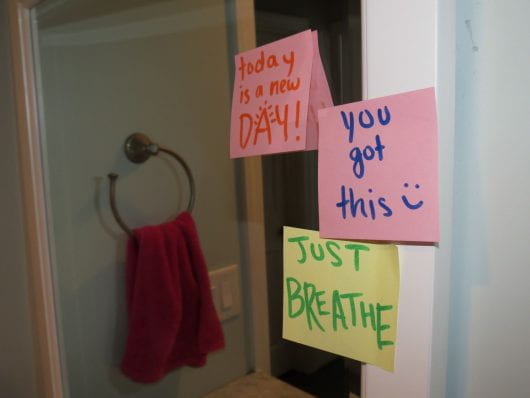
One of the ways to combat anxiety during the pandemic to try to be present in the moment and turn negative thoughts into positive ones. Credit: Olivia Albert | Lantern Reporter
Forty million adults are affected by anxiety disorders, according to the Anxiety and Depression Association of America, and because of the COVID-19 outbreak, more people could be experiencing anxiety.
With orders to stay at home and grocery stores being ravaged, stress levels might be increasing, but Bernadette Melnyk, Ohio State’s chief wellness officer and dean of the College of Nursing, said there are ways to cope with the anxiety that comes with a global health crisis, which members of the Ohio State community are feeling.
“The fear of the spread of this virus, the isolation that people are experiencing, it is leading people to have feelings of stress, anxiety and despair,” Melnyk said.
Melnyk said that when people fear they are losing control over an aspect of their lives, they try to gain control over other aspects, leading to coping mechanisms like stockpiling toilet paper. But instead of stockpiling, Melnyk said it is important to look inward when dealing with stress.
“If we can monitor our emotions and our physical symptoms, we can regulate those more effectively early on before we begin to suffer adverse effects,” Melnyk said.
Though social distancing is encouraged to slow the spread of the disease, Melnyk said it can be damaging to public health if social exchanges are not replicated in another way.
“We need virtual social interaction like crazy right now,” she said. “We gotta stop saying, ‘We’ve got to do social distancing.’ Distancing is extremely important, but let’s talk about physical distancing, not social distancing.”
Melnyk also said that to combat anxiety sparked by the pandemic, it is critical to be present in the moment and turn negative thoughts into positive ones.
One way for people to promote positive thinking, Melnyk said, is by saying two or three positive things about themselves in the morning and at night. She said forming a habit of positive self-talk will decrease stress and anxiety.
As far as exercises to help stay present, Melnyk said counting while chewing gum and deep breathing are efficient. She also said healthy eating habits, physical activity and at least seven hours of sleep per night help reduce stress levels.
“The news is gonna disrupt sleep for many people. Don’t turn on the news within a couple of hours before you go to bed at night,” Melnyk said.
Madi Hart, a second-year in English education, said she has lived with anxiety and panic disorders, but worldwide panic is different.
“The coping skills I’ve learned over the years don’t work as well when everyone is panicking and it’s for a justified reason,” Hart said.
Hart said that limiting her exposure to the panic of others and staying home has helped her to feel in control and allow her to think about things other than the pandemic while still keeping others safe.
Amanda Constantine, a lecturer in the Department of Human Sciences at Ohio State, said that while she is not anxious about her own well-being, she does worry about her at-risk friends and family.
“The majority of my family have not been given the chance to work from home or are unable to do so,” Constantine said. “They’re constantly interacting with others and are unable to continue earning an income if they step away from their jobs. It’s really disheartening.”
Constantine said she is disappointed she cannot finish the semester teaching her students face-to-face and feels for students who did not have the opportunity to say goodbye to friends, but hopes everyone can stay optimistic.
“I know that this time is overwhelming and upsetting, so I just hope that they’re all able to stay positive about their situations,” Constantine said. “I read something that said we’ve all been stocking up on toilet paper and hand sanitizer, but maybe we should consider stocking up on compassion for others and hope.”
Melnyk said the Ohio State: Wellness app will add new resources weekly in partnership with different departments across campus. She also developed a new webpage, go.osu.edu/copingwithcovid19, that features tips for handling anxiety related to the outbreak, and Counseling and Consultation Services provides skill-building videos on its website in place of workshops, as well as telephone triage video counseling sessions.
Melnyk said if students are feeling anxious or depressed to the point that it’s interfering with their ability to think and function, it is the time to seek help.


